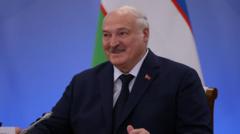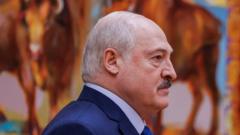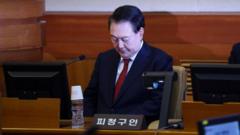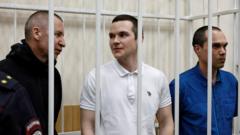In a recent interview with BBC, Belarusian President Alexander Lukashenko addressed accusations of electoral misconduct, arguing that his rivals have made personal choices leading them to imprisonment or exile. Despite widespread national and international criticism, Lukashenko maintains that his administration operates within a legal framework and is disconnected from perceived democratic failures.
Lukashenko Defends Controversial Election Amid Criticism of Democracy in Belarus
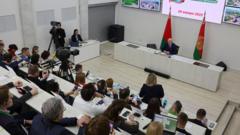
Lukashenko Defends Controversial Election Amid Criticism of Democracy in Belarus
In a state TV press conference, Belarus' leader brushes aside international concerns regarding the legitimacy of his election.
Long-time Belarusian leader Alexander Lukashenko, often referred to as "Europe's last dictator," recently participated in a highly unusual election event at Polling Station 478 in Minsk. While voters were still casting their ballots, Lukashenko held a four-and-a-half hour press conference broadcasted live on state television. The event turned into a platform for the leader to respond to questions about the validity of the election, commonly labeled a “sham” by critics.
BBC Russia editor Steve Rosenberg challenged Lukashenko directly: "How can you call this a democratic election, when your main rivals are either in prison or in exile?" Lukashenko responded that the choice to engage in dissent and face imprisonment or exile was a personal decision. "Some are in prison, and some are in exile. But you are here! Everyone has the right to choose. That is democracy," he stated.
When pressed about the over 1,200 political prisoners currently in Belarus, including notable figures like Maria Kolesnikova, Lukashenko dismissed the notion that his actions constituted political repression. "Prison is for people who have opened their mouths too wide and who have broken the law," he asserted, drawing parallels with other countries like the UK and the US.
Even with four other candidates on the ballot, many observers consider them to be mere figureheads, as they offer little real challenge to Lukashenko's leadership. "One of them openly supports you; another praises you," Rosenberg pointed out. Lukashenko, basking in applause from the local media, responded with acceptance to the characterization of their candidacies as odd.
European Union foreign policy chief Kaja Kallas has condemned the election as a "blatant affront to democracy." However, Lukashenko remains largely unbothered by such critiques, remarking, "I couldn't care less whether you recognize our election or whether you don't. The most important thing for me is that the people of Belarus recognize it."
As the media and observers continue to scrutinize the political landscape in Belarus, Lukashenko's steadfast contentment with his political standing highlights the deep divisions regarding governance and the notion of democracy in the nation.





